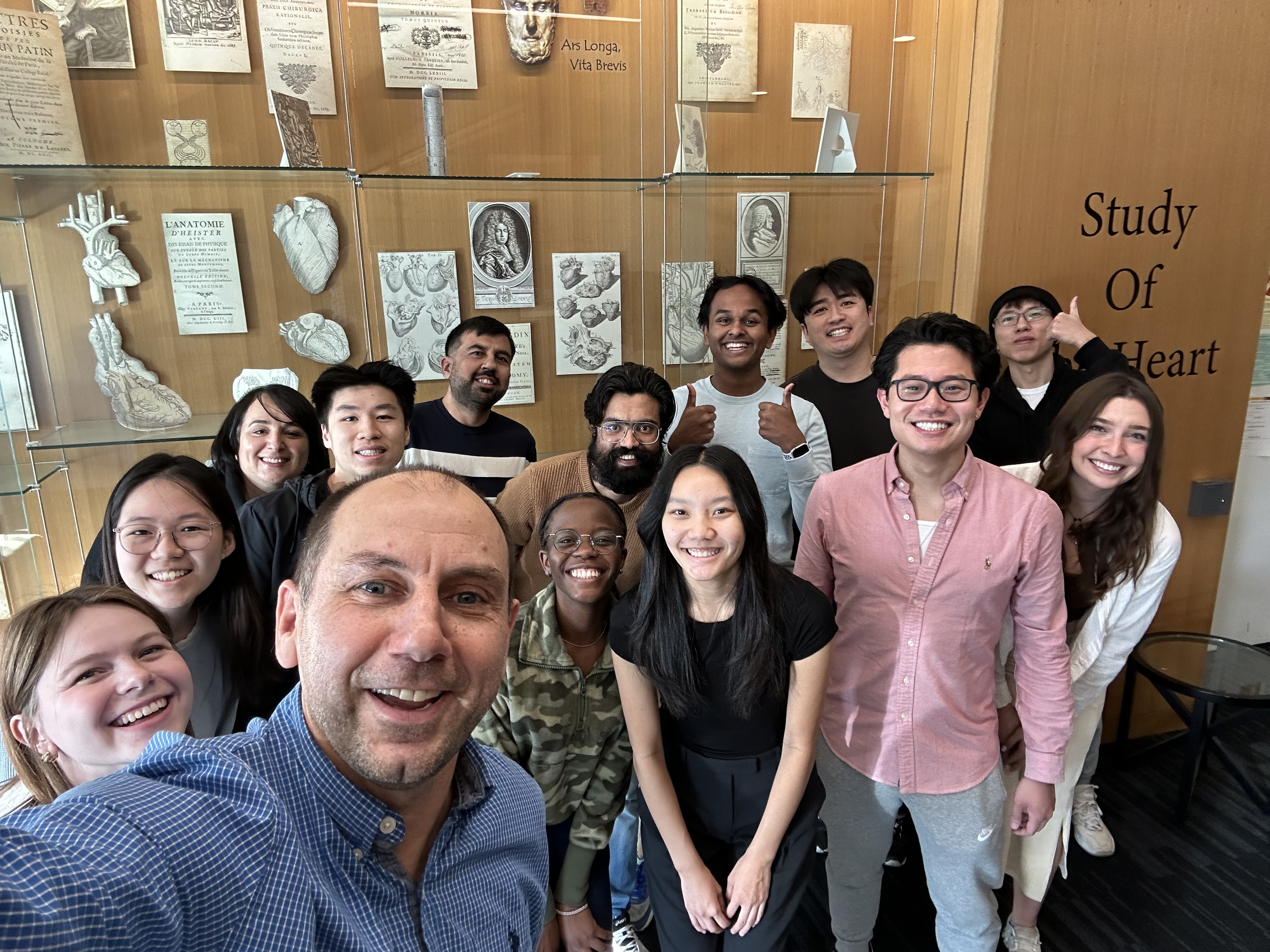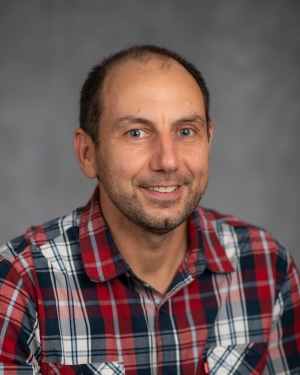Bosnakovski Lab
The Bosnakovski lab is focused on tissue regeneration and understanding the molecular and cellular mechanisms of FSHD and sarcomas. The current work includes exploring the molecular and cellular effects of DUX4 expression in skeletal muscle and studying antifibrotic drugs on an FSHD mouse model. The lab is also modeling the initiation of CIC-DUX4 pediatric sarcomas and exploring novel epigenetic-targeted therapies for Ewing sarcomas.
Exploring the molecular and cellular effects of transient DUX4 expression in skeletal muscle
The progressive muscular dystrophy, facioscapulohumeral muscular dystrophy (FSHD), is caused by inappropriate expression of the DUX4 gene, but the disease typically does not progress in a smooth fashion, rather in episodes or stages that are thought to be associated with transient bursts of DUX4 expression, because direct evidence of DUX4 protein in muscle specimens has not yet been demonstrated. This project aims to understand whether transient DUX4 expression is sufficient to trigger degenerative processes or to set up a pro-degenerative state that together with injury will lead to a muscle dystrophic phenotype seen in FSHD patients. (Supported by NIH/NIAMS 1R01AR081228, PI: Bosnakovski)
Testing the effects of antifibrotic drugs on an FSHD mouse model and FSHD fibroadipoprogenitors: the first step toward antifibrotic therapy for FSHD.
Currently, there is no specific therapy for FSHD and the patients are in great need of supportive therapy that will moderate the symptoms and improve their quality of life. Accumulation of the fibrous and fat tissue between atrophic myofibers is the hallmark of FSHD pathohistology. Fibroadipogenic progenitors are resident cells in the muscle that are the main contributors in the synthesis and deposition of the excessive extracellular matrix in the muscle. Fibrosis that usually progresses to scar formation negatively affects muscle function. Managing and reversing fibrosis is one key approach that can improve muscle function in FSHD patients. We generated a mouse model for FSHD that closely resembles FSHD pathology, allowing us to study the disease's mechanism and test different therapies. (Supported by Friends of FSH Research, PI: Bosnakovski)
Interrogation of mDUX expression in muscle in mice.
FSHD is caused by ectopic expression of the DUX4 transcription factor in muscle. The DUX gene family comprises 3 clades: A, B, C, of which DUX4 is the human and mDux is the mouse representative of the DUXC clade. Despite the tremendous progress achieved in understanding the genetics of FSHD, we know very little about cellular events that contribute to the dystrophic muscle phenotype. Therefore, the most suitable models to study complex tissue pathology as FSHD are animal models. To model FSHD in vivo, we developed a mouse model, iDUX4pA;HSA, based on DUX4 expression in skeletal muscle that exhibits gross pathohistological findings characteristic of FSHD. Despite the similarities between the animal model and FSHD pathologies, there is a degree of uncertainty regarding the relevance of studying FSHD by expressing a human gene (DUX4) in a mouse. The assumption is that DUX4 might induce different molecular and cellular responses in humans than in mice. To address this issue, we generated the imDux;HSA mouse designed to tunably express mDux in skeletal muscles and propose research with the following aims: (1) to understand pathological alterations that arise from acute and chronic mDux expression in myofibers of the imDux;HSA mouse and to compare them to that of the iDUX4pA;HSA mouse; (2) to understand the contribution of muscle mononuclear cell compartments in the dystrophic processes provoked by mDux and DUX4. Understanding the relationship between mDux and DUX4 will be essential to fully understand the feasibility of mouse animal models for FSHD. The imDux model is intended to be a useful addition and not a replacement for existing FSHD animal models. Multiple animal models that approach the FSHD enigma from different angles provide a better opportunity to understand the disease's mechanism and develop effective therapies. (Supported by Friends of FSH Society, PI: Bosnakovski)
Modeling the initiation of CIC-DUX4 pediatric sarcomas
In recent years, CIC-DUX4 sarcoma (CDS) has been recognized as a distinct subtype of pediatric sarcoma with an extremely poor prognosis. CDS rapidly develops resistance to the current chemotherapeutics, thus, novel specific therapies are greatly needed. Although the recent studies improved our molecular understanding of CDS, the early development of the disease, the cell-of origin of CDS, remains poorly understood. Identifying the cell-of-origin of CDS may allow earlier diagnosis and better prediction of tumor behavior and ultimately can lead to the development of preventive cell-specific targeted therapies. (Supported by Children’s Cancer Research Fund, PI: Bosnakovski)
Rewriting epigenetic landscape in Ewing pediatric sarcomas
Ewing sarcoma (ES) is a highly aggressive pediatric neoplasm arising in bone and soft tissues. The treatment relies on a combination of surgery, radiotherapy, and conventional multi-agent chemotherapy. Despite this extensive therapy, the tumor will relapse in 3 of 4 cases with metastatic ES. The 5-year survival rate in these patients is between 15% and 30%. Therefore, effective therapy is greatly needed. Most ES tumors have a translocation involving chromosomes 22 and 11 that leads to the formation of EWS-FLI1 oncogene. EWS-FLI1 drives ES malignancy through activations of an array of target genes that play a role in various processes including cell proliferation, survival, and metastasis. We are exploring novel epigenetic-targeted therapies for Ewing sarcomas. (Supported by Children’s Cancer Research Fund, PI: Bosnakovski)
Bosnakovski, D., Oyler, D., Mitanoska, A., Douglas, M., Ener, E. T., Shams, A. S., & Kyba, M. (2022). Persistent Fibroadipogenic Progenitor Expansion Following Transient DUX4 Expression Provokes a Profibrotic State in a Mouse Model for FSHD. International journal of molecular sciences, 23(4):1983. PMID: 35216102
Bosnakovski, D., Ener, E. T., Cooper, M. S., Gearhart, M. D., Knights, K. A., Xu, N. C., Palumbo, C. A., Toso, E. A., Marsh, G. P., Maple, H. J., & Kyba, M. (2021). Inactivation of the CIC-DUX4 oncogene through P300/CBP inhibition, a therapeutic approach for CIC-DUX4 sarcoma. Oncogenesis, 10(10):68. PMID: 34642317
Bosnakovski, D., Gearhart, M. D., Ho Choi, S., & Kyba, M. (2021). Dux facilitates post-implantation development, but is not essential for zygotic genome activation. Biology of reproduction, 104(1), 83-93. PMID: 32997106
Bosnakovski, D., Shams, A. S., Yuan, C., da Silva, M. T., Ener, E. T., Baumann, C. W., Lindsay, A. J., Verma, M., Asakura, A., Lowe, D. A., & Kyba, M. (2020). Transcriptional and cytopathological hallmarks of FSHD in chronic DUX4-expressing mice. Journal of Clinical Investigation, 130(5), 2465-2477. PMID: 32250341
Bosnakovski, D., da Silva, M. T., Sunny, S. T., Ener, E. T., Toso, E. A., Yuan, C., Cui, Z., Walters, M. A., Jadhav, A., & Kyba, M. (2019). A novel P300 inhibitor reverses DUX4-mediated global histone H3 hyperacetylation, target gene expression, and cell death. Science Advances, 5(9):eaaw7781. PMID: 31535023
Click here to see a complete list of Dr. Boshnakovski’s studies which have been published by academic and research journals.
Postdocs:
Haseeb Ahsan, PhD
Erdong Wei, MD
Ajay Ram Vachanaram, PhD
Usuk Jung, PhD
Technician:
Ana Mitanoska
Undergraduates:
Dana Yang
Kendall Porter
Kenric Chen
Mahir Haque
Michelle Osiro
Quinn O’Brien
Roj Cosiquien
Wenxuan Zhu
Silvie Reitz
Postdoc, research associate, and undergraduate student positions are available. Please contact Dr. Darko Bosnakovski at darko@umn.edu if you are interested in joining the group.

Postdoc Alumni:
Ahmed Mahmoud, MD 2023 (Washington University, St. Louis)
Undergraduate Alumni:
MacKenzie Molina 2022-2023 (Indiana University School of Medicine)
Lauren Loppnow 2022-2023 (UMN)
Eric Cheng 2022 (Carleton College)
Deeya Patel 2022-2023 (UMN)
Jasmine Gulik 2021-2023 (UMN)
David Oyler 2020-2022 (Idaho University, Medical School)
Natalie Xu 2019-2022 (School of Dentistry, University of Missouri, Kansas City)
2022

Principal Investigator
Darko Bosnakovski, DVM, PhD
Assistant Professor
Department of Pediatrics
Division of Blood and Marrow Transplantation & Cellular Therapy
Contact Us
darko@umn.edu
Office Phone: (612) 625-7993